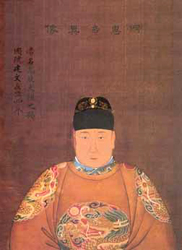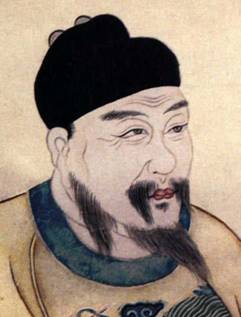| |||||
| Decades: | |||||
|---|---|---|---|---|---|
| See also: | Other events of 1682 History of China • Timeline • Years | ||||
Events from the year 1682 in China .
| |||||
| Decades: | |||||
|---|---|---|---|---|---|
| See also: | Other events of 1682 History of China • Timeline • Years | ||||
Events from the year 1682 in China .

The Hongwu EmperorZhu Yuanzhang, was the founding emperor of the Ming dynasty, reigning from 1368 to 1398.

The Wanli Emperor, personal name Zhu Yijun, was the 14th Emperor of the Ming dynasty, reigned from 1572 to 1620. "Wanli", the era name of his reign, literally means "ten thousand calendars". He was the third son of the Longqing Emperor. His reign of 48 years (1572–1620) was the longest among all the Ming dynasty emperors and it witnessed several successes in his early and middle reign, followed by the decline of the dynasty as the Emperor withdrew from his active role in government around 1600.

The Chongzhen Emperor, personal name Zhu Youjian, was the 17th and last Emperor of the Ming dynasty as well as the last ethnic Han to rule over a unified China proper. He reigned from 1627 to 1644. "Chongzhen," the era name of his reign, means "honorable and auspicious".

The Jianwen Emperor was the second Emperor of the Ming dynasty, reigned from 1398 to 1402. His personal name was Zhu Yunwen (朱允炆). The era name of his reign, Jianwen, means "establishing civility" and represented a sharp change in tone from Hongwu, the era name of the reign of his grandfather and predecessor, the Hongwu Emperor. His reign did not last long: an attempt to restrain his uncles led to the Jingnan rebellion. The Jianwen Emperor was eventually overthrown by one of his uncles, Zhu Di, who was then enthroned as the Yongle Emperor. Although the Yongle Emperor presented a charred body as Zhu Yunwen's, rumours circulated for decades that the Jianwen Emperor had disguised himself as a Buddhist monk and escaped from the palace when it was set on fire by Zhu Di's forces. Some people speculated that one of the reasons behind why the Yongle Emperor sponsored the admiral Zheng He on his treasure voyages in the early 15th century, was for Zheng He to search for the Jianwen Emperor, who was believed to have survived and fled to Southeast Asia. Some historians believe that the Jianwen Emperor had indeed survived and escaped from Nanjing, but the official histories of the Ming dynasty were modified later during the Qing dynasty to please the Manchu rulers.
The Yongli Emperor, personal name Zhu Youlang, was the fourth and last emperor of the Southern Ming dynasty. His era name means "Perpetual calendar".

Zhu Yujian, the Prince of Tang, reigned as the Longwu Emperor of the Southern Ming dynasty from 18 August 1645, when he was enthroned in Fuzhou, to 6 October 1646, when he was captured and executed by a contingent of the Qing army. He was an eighth generation descendant of Zhu Jing, Prince Ding of Tang, who was the 23rd son of Ming founder Zhu Yuanzhang.
The Hongguang Emperor, personal name Zhu Yousong, was the first emperor of the Southern Ming Dynasty. He reigned briefly in Southern China from 1644-1645. His era name, Hongguang, means "Great light".
Zhu is the pinyin romanization of four Chinese surnames: 朱, 祝, 竺, 猪 and 諸. It is alternatively spelled Chu, Gee in the United States, and Choo. It is the 17th name in the Hundred Family Surnames poem.

Zhu Shugui, courtesy name Tianqiu and art name Yiyuanzi, formally known as the Prince of Ningjing, was a Ming dynasty prince and the last of the pretenders to the Ming throne after the fall of the Ming Empire in 1644. He committed suicide when forces of the Manchu-led Qing dynasty conquered the Southern Ming dynasty's Kingdom of Tungning in Taiwan, where he took shelter after mainland China fell under Qing control. He was a ninth-generation descendant of Zhu Yuanzhang, the founder of the Ming dynasty, via the line of Zhu Yuanzhang's 15th son, Zhu Zhi 朱植. Zhu Zhi was the son of Zhu Yuanzhang and one of his Korean concubines, a female consort surnamed Han from Goryeo in Korea. Zhu Zhi's heirs used the generation names "Gui, Hao, En, Chong, Zhi, Yun, Reng, Qi, Bao, He, Xian, Shu, Yan, Zun, Ru, Cai, Han, Li, Long, Yu".

The Southern Ming, officially the Great Ming, was a series of dynastic rump states ruled by the Zhu clan in southern China following the Ming dynasty's collapse in 1644. The Ming dynasty ended when Shun forces led by Li Zicheng captured Beijing and the last Ming emperor Chongzhen committed suicide. The Ming general Wu Sangui then opened the gates of the Shanhai Pass in the eastern section of the Great Wall to the multi-ethnic Qing banners, in hope of using them to annihilate the Shun forces. Ming loyalists fled to Nanjing, where they enthroned Zhu Yousong as the Hongguang Emperor, marking the start of the Southern Ming. The Nanjing regime lasted until 1645, when Qing forces captured Nanjing. Later figures continued to hold court in various southern Chinese cities, although the Qing considered them to be pretenders.
The Gengyin Emperor, personal name Zhu Yihai, was an emperor of the Southern Ming Dynasty, reigning from 1645 to 1655. He has no temple name.
The House of Zhu, also rendered as the House of Chu, was the imperial family of the Ming dynasty and the Southern Ming dynasty of China. Zhu was the family name of the Ming and Southern Ming emperors. The House of Zhu ruled the Ming dynasty from 1368 until its fall in 1644, followed by the rule as the Southern Ming dynasty until 1662. The last Ming princes, the Prince of Ningjing Zhu Shugui and Prince Zhu Honghuan (朱弘桓) held out until the annexation of the Kingdom of Tungning in 1683.
The Imperial Clan Court or Court of the Imperial Clan was an institution responsible for all matters pertaining to the imperial family under the Ming and Qing dynasties of imperial China.
The Zhuang Tinglong case, also known as the Ming History case, was a 17th-century case of literary inquisition which took place in China between 1661 and 1663 during the Qing dynasty. The case was about the publication of an unauthorised history of the Ming dynasty – the ruling dynasty in China before the Qing dynasty – by Zhuang Tinglong, a merchant from northern Zhejiang Province. At the end, thousands of people associated with the publication of the work were punished, including over 70 put to death.
Marquis of Extended Grace was a title held by a descendant of the imperial family of the Ming dynasty (1368–1644) during the subsequent Qing dynasty (1644–1912). Holders of this title were also called the Marquis of Zhu from the surname of the Ming imperial clan. The marquis presided at memorial ceremonies held twice a year at the Ming tombs near Beijing.
Events from the year 1662 in China.
Events from the year 1673 in China.
Events from the year 1675 in China.
Events from the year 1677 in China.
Events from the year 1683 in China.